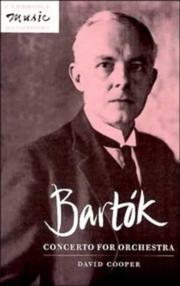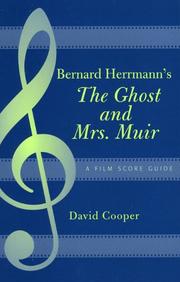| Listing 1 - 10 of 225 | << page >> |
Sort by
|
Book
ISBN: 0140220666 9780140220667 Year: 1980 Publisher: Harmondsworth: Penguin books,
Abstract | Keywords | Export | Availability | Bookmark
 Loading...
Loading...Choose an application
- Reference Manager
- EndNote
- RefWorks (Direct export to RefWorks)
Psychiatry --- Antipsychiatry --- Schizophrenics --- Language --- Schizophrenics - Language

ISBN: 0521485053 0521480043 1139085298 0511611668 9780521480048 9780511611667 9780521485050 Year: 1996 Volume: *18 Publisher: Cambridge Cambridge University Press
Abstract | Keywords | Export | Availability | Bookmark
 Loading...
Loading...Choose an application
- Reference Manager
- EndNote
- RefWorks (Direct export to RefWorks)
Bartók's Concerto for Orchestra has proved to be one of the most popularly successful concert works of the twentieth century. It is seen by its champions as an example of Bartók's seamless blend of Eastern European folk music and Western art music, and by its detractors as indicative of the composer's artistic compromise. This book contains a discussion of the historical and musical contexts of the piece, its early performance history and critical reception. It also includes the first complete movement-by-movement synopsis of the Concerto as well as detailed technical information about the work. Throughout the study attention is drawn to the sources of Bartók's musical language, especially those derived from the many folk musics he studied.
Book
ISBN: 9780300148770 0300148771 Year: 2015 Publisher: New Haven, London : Yale University Press,
Abstract | Keywords | Export | Availability | Bookmark
 Loading...
Loading...Choose an application
- Reference Manager
- EndNote
- RefWorks (Direct export to RefWorks)
Composers --- Music --- Compositeurs --- Musique --- Biography. --- History and criticism --- Biographies --- Histoire et critique --- Bartók, Béla, --- Bartók, Béla,

ISBN: 0810856794 Year: 2005 Volume: 5 Publisher: Lanham (Md) Scarecrow
Abstract | Keywords | Export | Availability | Bookmark
 Loading...
Loading...Choose an application
- Reference Manager
- EndNote
- RefWorks (Direct export to RefWorks)
Book
ISBN: 0140218076 Year: 1976 Publisher: Harmondsworth Penguin books
Abstract | Keywords | Export | Availability | Bookmark
 Loading...
Loading...Choose an application
- Reference Manager
- EndNote
- RefWorks (Direct export to RefWorks)
Book
ISBN: 9060090551 Year: 1973 Publisher: Meppel Boom
Abstract | Keywords | Export | Availability | Bookmark
 Loading...
Loading...Choose an application
- Reference Manager
- EndNote
- RefWorks (Direct export to RefWorks)
241.64*5 --- 292.5 --- 316.3 --- Gezinssociologie --- Theologische ethiek: seksualiteit binnen het gezin --- 241.64*5 Theologische ethiek: seksualiteit binnen het gezin --- Educational sciences --- Psychiatry --- Social psychology --- Human medicine --- Sociology of the family. Sociology of sexuality --- Depth psychology --- gezinspsychologie --- gezinssociologie --- cultuursociologie --- antipsychiatrie --- maatschappijkritiek --- 159.92 --- 392.5 --- 008 --- 616 --- 304 --- Family --- Life-forms --- Upbringing --- Psychological vulnerabilities --- Psychoanalysis --- Socialization --- Theory --- Therapy --- Book
Book
ISBN: 0140212876 Year: 1974 Publisher: Middlesex Penguin Books
Abstract | Keywords | Export | Availability | Bookmark
 Loading...
Loading...Choose an application
- Reference Manager
- EndNote
- RefWorks (Direct export to RefWorks)
This work has convinced the author that the concept of the family pervades the inner life, destroying the sexual and social independence of the individual.
Educational sciences --- Psychiatry --- Social psychology --- Human medicine --- Sociology of the family. Sociology of sexuality --- Depth psychology --- #GGSB: Huwelijksmoraal --- #GGSB: Psychologie --- Huwelijksmoraal --- Psychologie --- Family --- Life-forms --- Upbringing --- Psychological vulnerabilities --- Psychoanalysis --- Socialization --- Theory --- Therapy --- Book
Book
ISBN: 1351542087 1351542079 1315085763 1282243403 9786612243400 075469383X 9780754693833 0754662306 9780754662303 9780754662303 9781282243408 9781315085760 9781351542067 9781409419204 9781351542081 9781351542074 6612243406 Year: 2009 Publisher: Farnham, Surrey, England ; Burlington, VT : Ashgate,
Abstract | Keywords | Export | Availability | Bookmark
 Loading...
Loading...Choose an application
- Reference Manager
- EndNote
- RefWorks (Direct export to RefWorks)
"For at least two centuries, and arguably much longer, Ireland has exerted an important influence on the development of the traditional, popular and art musics of other regions, and in particular those of Britain and the United States. During the past decade or so, the traditional musics of the so-called Celtic regions have become a focus of international interest. The phenomenal success of shows such as Riverdance (which appeared in 1995, spawned from a 1994 Eurovision Song Contest interval act) brought Irish music and dance to a global audience and played a part in the further commoditization of Irish culture, including traditional music. However, there has been until now, relatively little serious musicological study of the traditional music of Northern Ireland. Northern Ireland remains a divided community in which traditional culture, in all its manifestations, is widely understood as a marker of religious affiliation and ethnic identity. Since the outbreak of the most recent 'troubles' around 1968, the borders between the communities have often been marked by music. For example, many in the Catholic, nationalist community, regard the music of Orange flute bands and Lambeg drums as a source of intimidation. Equally, many in the Protestant community have distanced themselves from Irish music as coming from a different ethnic tradition, and some have rejected tunes, styles and even instruments because of their association with the Catholic community and the Irish Republic. Of course, during the same period many other Protestants and Catholics have continued to perform in an apolitical context and often together, what in earlier times would simply have been regarded as folk or country music. With the increasing espousal of a discrete Ulster Scots tradition since the signing of the Belfast (or 'Good Friday') Agreement in 1998, the characteristics of the traditional music performed in Northern Ireland, and the place of Protestant musicians within popular Irish cult"--Provided by publisher.
Folk music --- Irish Americans --- Ethnology --- Irish --- Ethnic music --- Traditional music --- Folklore --- Music --- History and criticism.
Book
ISBN: 0300213077 9780300213072 9780300148770 0300148771 Year: 2015 Publisher: New Haven, CT : Yale University Press,
Abstract | Keywords | Export | Availability | Bookmark
 Loading...
Loading...Choose an application
- Reference Manager
- EndNote
- RefWorks (Direct export to RefWorks)
The definitive account of the life and music of Hungary's greatest twentieth-century composer This deeply researched biography of Béla Bartók (1881-1945) provides a more comprehensive view of the innovative Hungarian musician than ever before. David Cooper traces Bartók's international career as an ardent ethno-musicologist and composer, teacher, and pianist, while also providing a detailed discussion of most of his works. Further, the author explores how Europe's political and cultural tumult affected Bartók's work, travel, and reluctant emigration to the safety of America in his final years. Cooper illuminates Bartók's personal life and relationships, while also expanding what is known about the influence of other musicians-Richard Strauss, Zoltán Kodály, and Yehudi Menuhin, among many others. The author also looks closely at some of the composer's actions and behaviors which may have been manifestations of Asperger syndrome. The book, in short, is a consummate biography of an internationally admired musician.
Composers --- Bartók, Béla, --- Bartokas, B.,
Book
Year: 1976 Publisher: Harmondsworth: Penguin books,
Abstract | Keywords | Export | Availability | Bookmark
 Loading...
Loading...Choose an application
- Reference Manager
- EndNote
- RefWorks (Direct export to RefWorks)
| Listing 1 - 10 of 225 | << page >> |
Sort by
|

 Search
Search Feedback
Feedback About UniCat
About UniCat  Help
Help News
News